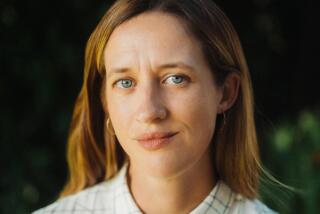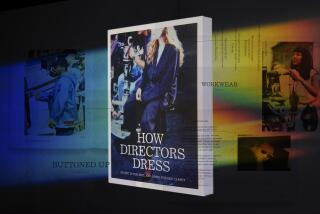The Twists Along ‘Mulholland’
“Mulholland Dr.” is a mystery that doesn’t want to be solved. It’s a dark dreamscape that needs to be experienced, not explained, a puzzle that’s eager to fool the mind the way trompe l’oeil paintings trick the eye. And even if it makes sense in writer-director David Lynch’s mind, he’d probably prefer that it didn’t in yours.
In fact, this master of mystification and misdirection toys with our desire for order, using the force of our love of narrative coherence to upend us psychologically like a judo master would toss a charging opponent. Though a number of explanations are possible for what goes on in this noirish L.A. story set in and around the movie business, all of them just might be beside the point.
That’s not just because no theory can adequately cover all the strange doings in Lynch’s meditation on the links between those old friends, reality and dreams. It’s because what this filmmaker to a certain extent has always been about is images and their ability to go beyond logic to evoke moods that haunt our waking and sleeping lives. “If I could tell you what they were about,” Lynch said more than 20 years ago when asked about future projects, “I wouldn’t have to make them as films.”
What Lynch likes to do is construct something that looks like a conventional story but absolutely refuses to act in any expected way. “Mulholland Dr.” has all the elements of a dark drama set in Hollywood (and, in fact, an earlier version was originally shot as the pilot for a TV series ABC ended up rejecting), but its story is a tease for the unwary, a source of frustration for anyone who is looking for resolution.
Lynch’s aim is something different. It’s the creation of the unsettling, indefinable sense of dread usually experienced only by those imprisoned by dreams. He’s best at depicting forces that are beyond our understanding, mysterious individuals whose specifics we are not privy to, powerful men whose sources of power we cannot know.
In Lynch’s world, kindly people turn horrific for no reason and inanimate objects can seem terrifying. Working with frequent collaborators who understand his needs (cinematographer Peter Deming, production designer Jack Fisk, editor Mary Sweeney, composer Angelo Badalementi), the writer-director is freed up to dream his own particular kind of impossible dreams.
“Mulholland Dr.” is a particularly L.A. story, as distinctive as the unmistakable street sign shape that introduces the film’s title. One of the many ways its intertwined stories can be approached is as parables about the movie business, bizarre glosses on how Hollywood goes about its work. Blond and perky Betty Elms (Naomi Watts), as classic a fresh-faced ingenue as her Deep River, Ontario, roots suggest, is the archetypal naif who comes to town to make it big in the movie business. Her actress aunt has conveniently gone on location, leaving Betty with a great flat in one of Hollywood’s classic courtyard apartment complexes and a mother hen in the form of the ageless Coco (Hollywood veteran Ann Miller).
But that apartment, it turns out, is not as vacant as it should be. In it is a gorgeous, dark-haired woman (Laura Elena Harring) who calls herself Rita after spying a poster of Rita Hayworth as “Gilda” on the wall. Rita, it turns out, is as vacant as she is beautiful: A nightmarish experience has left her with amnesia. Of course, the caring Betty wants to do all she can to help Rita find herself while still taking time to audition for her big break.
Already well past his big break is an arrogant smart aleck of a director named Adam (Justin Theroux). He also tangles with forces he can’t understand, forces that seem to be willing and able to make a shambles of his life if he’s not willing to recast the lead actress in his next big studio movie.
Strongly acted all around, “Mulholland Dr.” puts these people into a lot of strange situations that hold our attention because of how confidently and atmospherically Lynch (who shared the best director prize at Cannes with the Coen brothers for “The Man Who Wasn’t There”) has re-created their dilemmas. But though “Mulholland Dr.” has major narrative shifts, at one point even becoming what intentionally feels like an alternate reality, it’s hard to shake the feeling that what has intrigued Lynch most of all are the film’s smallest, most evocative moments. There’s a way-after-hours spot called El Club Silencio that features a spectacular Spanish-language version of Roy Orbison’s “Crying.” There are two guys having a very strange breakfast at Winkie’s. And there’s a character named the Cowboy who operates out of a corral at the top of Beachwood Canyon and whose William S. Hart-Tom Mix look might be a vision remembered from Lynch’s Montana childhood.
Likely as not, these things mean nothing in a conventional plot sense, but as powerful images, as pictures from a dreamlike world, they are unforgettable. And that, David Lynch would probably say, is exactly the point.
*
MPAA rating: R for violence, language and some strong sexuality. Times guidelines: explicit scenes of masturbation and lesbian lovemaking as well as brief but vivid violence.
‘Mulholland Dr.’
Naomi Watts: Betty Elms
Laura Elena Harring: Rita
Justin Theroux: Adam
Ann Miller: Coco
Robert Forster: Detective McKnight
Dan Hedaya: Vincenzo Castigliane
Alain Sarde presents a production of Les Films Alain Sarde, Studiocanal, Picture Factory, released by Universal Focus. Director David Lynch. Producers Mary Sweeney, Alain Sarde, Neal Edelstein, Michael Polaire. Executive producer Pierre Edelman. Screenplay David Lynch. Cinematographer Peter Deming. Editor Mary Sweeney. Music Angelo Badalementi. Production design Jack Fisk. Running time: 2 hours, 27 minutes.
In limited release.
More to Read
Only good movies
Get the Indie Focus newsletter, Mark Olsen's weekly guide to the world of cinema.
You may occasionally receive promotional content from the Los Angeles Times.











